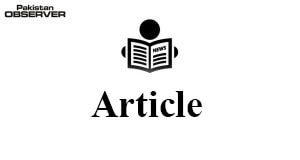With great power comes great responsibility
IT IS rightly said that “with great powers comes great responsibility” and I will be enlightening that how this is relatable to the current scenario of State Bank autonomy.
Pakistan’s external debt and liabilities rose from $95bn in 2018 to $115.75bn in 1HFY2021, with $5bn added just in past 6 months. While, Pakistan was ought to enter in a bailout package from IMF.
The $6bn program was agreed under some stringent conditions of increasing electricity tariffs, higher tax collection targets, privatization of public entities, some fiscal adjustments and increasing the repo rate which was lowered to 7% from 13.25% in June last year.
Dialogues between Pakistan and IMF were stalled last year as there was lot of agitation from the public and the fear of backlash from the middle class was probable. Opposition was giving hard time to the government.
Now as there is less steam from the opposition parties and their campaigning is losing grip, Government has reestablished their dialogues with IMF and have resumed the intended changes.
Recently, there has been approval from cabinet regarding hike in energy tariffs, withdrawal of corporate income tax exemption and the state enterprises to be free from ministries, including the absolute autonomy of SBP.
There is lot of hue and cry in Pakistan among many politicians over the issue of Btate Bank being an autonomous body with the core function of domestic price stability only.
The kind of goal autonomy, suggested by the Cabinet members or in other words, dictated by IMF are quite alarming as then our monetary policy will be under direct control of IMF.
In ensuring the price stability if other macroeconomic objectives are not complimentary, they can weaken the credibility of monetary policy by eroding clarity and transparency.
That is why some small open economies like Hong Kong, Qatar, Saudi Arabia, UAE to name a few, have decided that maintaining domestic price stability can best be achieved by pursuing a fixed exchange rate policy, which presumes that the economy and the pegged currency are affected similarly by market volatility.
This sort of policy is favourable for developing countries as it protects economy from fluctuation, curbs inflation and promotes foreign direct investment.
Pakistan was also having a pegged Exchange rate policy until it was left to float by the current Government and we have experienced negative effects of it, because of other antagonistic macro-economic conditions.
When state delegates this level of autonomy, there should be in place an appropriate check and balance mechanism to minimize any abuse of power by the Governor, Deputy Governor and board members.
Like in case of Federal Reserve Bank of USA where, there is an independent body to ensure control mechanism.
While in our case Pakistan State Bank governing members have been given immunity against FIA and NAB.
SBP has not been given any aim in terms of inflation rate as in case of target autonomy exercised by Eurozone where target is given by Euro Central Bank to keep the inflation target at 2%.
If we take the case of our neighbouring countries like India and Bangladesh it seems more like an instrument autonomy in which the government or the legislative body decides the monetary policy or target, in agreement with the Central Bank and the exchange rate regime, but the central bank retains sufficient authority to implement the monetary policy target using the instrument it perceives fit.
A democracy is entitled to an autonomous state bank and IMF also favours independent Central Bank which is not under any political influence. But the amount of absolute power suggested in the bill is raising lots of concerns.
The Finance Ministry has directly sent this bill to federal cabinet for approval while bypassing Cabinet Committee on Legislative cases (CCLC).
With this absolute autonomy the Governor of State Bank will be more powerful than the Prime Minister in terms of monetary policy and will solely be responsible for dealing with IMF and crafting the policies upon which the economy of Pakistan will depend.
Pakistan is an atomic power with enormous amounts of debts, which itself is a risk to our national security. With this change IMF will gain substantial control on our policies.
This level of autonomy delegated to the State Bank affect the design of the governing bodies and calls for good amount of accountability provisions.
Strong responsibility provisions are needed with increased powers to ensure the authority delegated to the Central Bank is not abused.
Especially with our fraudulent system and deceitful individuals with soaring corruption index we must ensure that there won’t be any abuse of powers and future of Pakistan will be protected.
—Writer is a contributing columnist based in London.







